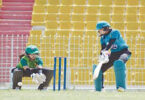Monitoring Desk
The end of the college football season began with a scene that would have looked bizarre 12 months ago — and will likely appear just as strange looking back years from now — but seemed entirely unremarkable Monday night.
Alabama coach Nick Saban and Ohio State coach Ryan Day met on the field during pregame warmups with their faces covered by protective black masks.
From start to finish, the specter of COVID-19 loomed large over the 2020 college football season and the national championship game was no exception.
Along with masks for almost everyone except the players, there were lots of empty seats — around 50,000 — for the College Football Playoff showdown. The game, played in the Miami Dolphins’ stadium, drew the sort of turnout typically found in the fourth quarter of an NFL preseason game.
For sports fans, the odd atmosphere has become frustratingly familiar — the Lakers, Lightning and Dodgers all won championships in mostly empty venues.
But the challenges college football faced in navigating the pandemic were unique. Many were pessimistic the season would ever reach the finish line when it began Aug. 29 with the Guardian Kickoff Classic between Austin Peay and Central Arkansas, a game attended by hundreds.
Nearly 130 subsequent Bowl Subdivision games were postponed or canceled after that and every week seemed to bring a headache or a twist tied to the coronavirus. Players around the country endured frequent testing as they tried to avoid campus outbreaks of the virus, with mixed success.
The Pac-12 and Big Ten postponed their seasons before reversing course, and Ohio State played only eight games. Alabama made it to the Rose Bowl, which because of the pandemic was played in Texas.
Fittingly, the championship game took place at a COVID-19 vaccination and testing site. Ohio State was without 13 players, and while the school didn’t give a reason, Day acknowledged last week the Buckeyes were dealing with new cases of the virus.
Saban tested positive for the virus twice during the season, with one result deemed a false positive.
The audience around the country was huge, however, as sports again offered a diversion and some semblance of normalcy. It was a made-for-TV season that ends with an asterisk, and college football now looks toward the 2021 season, which is a big question mark.
Courtesy: AP News






